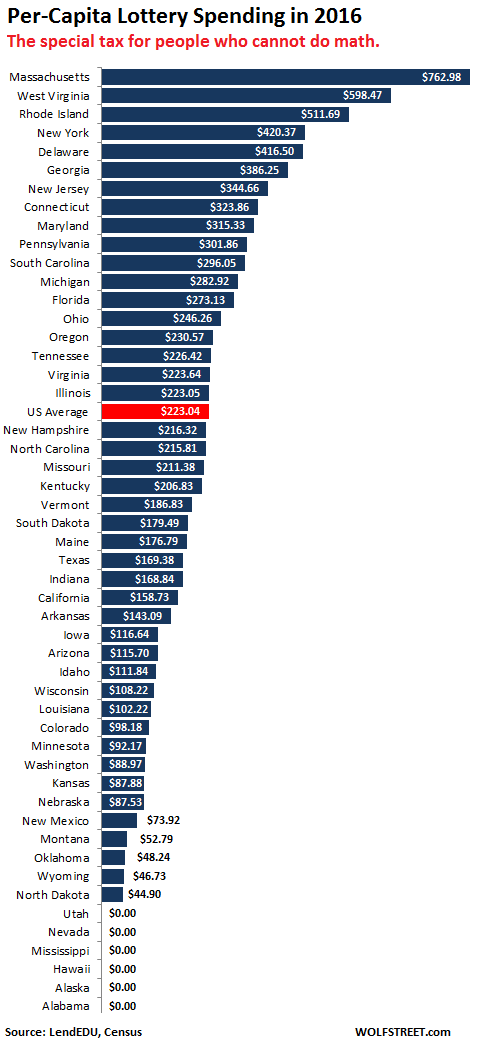Wolf Richter wolfstreet.com, www.amazon.com/author/wolfrichter
And states need it!
Tax day is approaching, and the gnashing of teeth is spreading across the nation. But there is one tax that people love to pay voluntarily – and have a huge amount of fun and excitement doing so: the lottery.
Playing the lottery is a special tax for people who cannot do math, it has been said. It’s definitely a special tax – the only such tax – because it is fun, exciting, and even addictive. It makes people eager to pay this tax. In fact, it is such a fun tax to pay that even consumer who don’t have to pay income taxes because they lack sufficient taxable income are also eager and able to pay the tax.
The proceeds from the lottery in the US go to state governments, along with other tax collections, such as sales taxes and income taxes. But those other taxes have to be extracted, if needed by the force of law, from more or less unwilling tax payers — the same people who eagerly pay the tax that is called lottery.
And it’s a lot of taxes: $72.75 billion in total lottery revenues (excluding commissions) were generated in the US in 2016, according to Census Bureau data on state finances, released this week. This was up 9% from 2015. At least something is booming in the US economy!
But it doesn’t all go to state governments. Of those revenues: $46.6 billion were paid out in prizes. Administration and promotion of lottery programs cost another $3.2 billion. The “proceeds available” — what’s left over for state funds — amounted to $22.9 billion.
So this is a tax that is fun and exciting to pay, but it also costs a lot for states to create this fun and excitement.
On a per-capita basis, spending grew 8% from a year earlier to $225.15 per person, on average, from baby to 100-year-old, based on a US population of 323.1 million in 2016.
It amounted to $577 per household on average. Given that many households don’t play the lottery, the average among households that do play the lottery is much higher.
New York State residents generated the most in revenue, with a total of $8.34 billion. California was second with a total of $6.28 billion. Third was Florida with $5.7 billion. That the big states would lead is logical. But fourth was the tiny state of Massachusetts with $5.2 billion.
On a per-capita basis, the most prolific spenders — the most eager to give to their state — were in Massachusetts with a lottery expense of $762.98 on average.
Six states — Alabama, Alaska, Hawaii, Mississippi, Nevada, and Utah — don’t have state lotteries, don’t sell tickets for multi-state lottery games, and residents in those states spend zero on this tax.
This chart shows the per-capita lottery spending in 2016, based on total lottery spending in the state divided by the state’s population (per-capita data via LendEDU):

“Winning the lottery” has become a cliché for a life-changing jump in wealth or some other mega-great event against huge odds. Statistically speaking, when people buy a lottery ticket, their chance of winning the jackpot are minuscule, and they’re nearly guaranteed to be disappointed. The chances are much better for smaller winnings, but on average, people will also be disappointed.
That’s the idea – allow a very small number of people to win very large sums, often measured in the hundreds of millions, which is what creates the excitement, when the total take across participating states can amount to tens of billions. The theory behind the lottery is to provide a fun, exciting, and even addictive way of paying additional taxes voluntarily, on top of the taxes that people have to pay already.
The lottery is heavily promoted in the media, and as the jackpot grows to $500 million or whatever, which is the case right now, the whole country is talking about it, and people storm to convenience stores at the last minute to buy their way out of their current situation, which just increases the take for the states.
In 2018, if recent growth trends hold, people will eagerly pay their states well over $80 billion in these voluntary taxes. And the lucky jackpot winners will also pay state and federal governments large sums for the privilege of having won the jackpot – income taxes being due on the gains. Alas, I wish – as I’m gnashing my teeth about the income taxes due on tax day – someone could figure out how to make paying all taxes this fun, easy, and exciting.